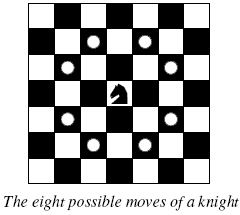|
A Knight's Journey
Description  Background
Background
The knight is getting bored of seeing the same black and white squares again and again and has decided to make a journey around the world. Whenever a knight moves, it is two squares in one direction and one square perpendicular to this. The world of a knight is the chessboard he is living on. Our knight lives on a chessboard that has a smaller area than a regular 8 * 8 board, but it is still rectangular. Can you help this adventurous knight to make travel plans? Problem Find a path such that the knight visits every square once. The knight can start and end on any square of the board. Input
The input begins with a positive integer n in the first line. The following lines contain n test cases. Each test case consists of a single line with two positive integers p and q, such that 1 <= p * q <= 26. This represents a p * q chessboard, where p describes how many different square numbers 1, . . . , p exist, q describes how many different square letters exist. These are the first q letters of the Latin alphabet: A, . . .
Output
The output for every scenario begins with a line containing "Scenario #i:", where i is the number of the scenario starting at 1. Then print a single line containing the lexicographically first path that visits all squares of the chessboard with knight moves followed by an empty line. The path should be given on a single line by concatenating the names of the visited squares. Each square name consists of a capital letter followed by a number.
If no such path exist, you should output impossible on a single line. Sample Input 3 1 1 2 3 4 3 Sample Output Scenario #1: A1 Scenario #2: impossible Scenario #3: A1B3C1A2B4C2A3B1C3A4B2C4 Source
TUD Programming Contest 2005, Darmstadt, Germany
|
[Submit] [Go Back] [Status] [Discuss]
#include <iostream>
#include <algorithm>
#include <cstdio>
#include <cmath>
#include <cstring>
#include <string>
#include <string.h>
#include <map>
#include <set>
#include <queue>
#include <deque>
#include <list>
#include <bitset>
#include <stack>
#include <stdlib.h>
#define lowbit(x) (x&-x)
#define e exp(1.0)
//ios::sync_with_stdio(false);
// auto start = clock();
// cout << (clock() - start) / (double)CLOCKS_PER_SEC;
typedef long long ll;
typedef long long LL;
using namespace std;
const int maxn=30;
int vis[maxn][maxn];
int n,m;
int dx[8]={-2,-2,-1,-1,1,1,2,2};
int dy[8]={-1,1,-2,2,-2,2,-1,1};
//方向要按照字典序
struct node
{
int x,y;
}p[maxn];
int flag;
void dfs(int x,int y,int step)
{
if(flag) return ;
p[step].x=x;
p[step].y=y;
if(step==n*m)
{
flag=1;
return;
}
node a;
for(int i=0;i<8;i++)
{
a.x=x+dx[i];
a.y=y+dy[i];
if(a.x>0 && a.x<=n && a.y>0 && a.y<=m && !vis[a.x][a.y])
{
vis[a.x][a.y]=1;
dfs(a.x,a.y,step+1);
vis[a.x][a.y]=0;
}
}
}
int main()
{
int T;
cin>>T;
int cas=1;
while(T--)
{
cin>>m>>n;
memset(vis,0,sizeof(vis));
memset(p,0,sizeof(p));
vis[1][1]=1;
flag=0;
dfs(1,1,1);
cout<<"Scenario #"<<cas++<<":"<<endl;
if(flag)
{
for(int i=1;i<=n*m;i++)
printf("%c%d",p[i].x-1+'A',p[i].y);
//cout<<(char)(p[i].x-1-+'A')<<p[i].y;
cout<<endl;
}
else
{
cout<<"impossible"<<endl;
}
if(T) cout<<endl;
}
return 0;
}























 1598
1598

 被折叠的 条评论
为什么被折叠?
被折叠的 条评论
为什么被折叠?








